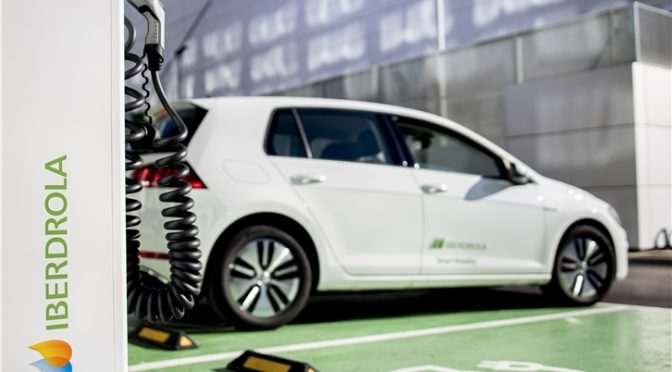The company will install 150,000 charging points in households, companies and on public highways (urban and interurban) over the next five years · It is investing in ultra and super-fast infrastructure (150 kW and 350 kW) that will have vehicles charged and back on the road in between five and 15 minutes.
Iberdrola has installed and is working on almost 2,000 charging stations on public roads in Spain, reaching more than 30 agreements to roll out infrastructures with the main players in the mobility field.
For the first time in Spain, the App incorporates verified information of all shippers on public roads in the country. There are currently more than 3,000 charging points operated by Iberdrola and other energy companies.
Iberdrola looks upon transport electrification as a key part of the transition to a decarbonised, sustainable, emission-free economy.
Iberdrola has decided to ramp up its sustainable mobility plan, with more investment – a total of 150 million euros – to provide an even larger number of electric vehicle charging stations within the next five years.
Iberdrola has made transport electrification one of the priorities of its strategy to transition toward a decarbonised economy based on renewable energy and smart networks, which is why it is stepping up the charging infrastructure plan in Spain, and implementing it in other markets where it operates, such as the United Kingdom, Portugal and Italy.
The new sustainable mobility plan entails installing around 150,000 electric vehicle charging points – six times the number in the original plan – in homes, companies and public highways in cities as well as the main motorways and highways over the next five years.
The availability of these infrastructures on public roads is essential to meet demand for charging points, to cater for the demand foreseen and to cover Spain’s main road and motorway network. Because of this, Iberdrola is installing rapid charging stations and will provide ultra-rapid stations (350 kW) every 200 kilometres, super-rapid (150 kW) every 100 kilometres and rapid (50 kW), every 50 kilometres.
Electric vehicle drivers using Iberdrola charging points can charge their electric vehicles with 100% green energy from clean generation sources with renewable Guarantee of Origin (GoO) certificates.
“Decarbonising our economy is not just a matter for the energy sector. It also requires participation and commitment by all emitting sectors, particularly the transport industry, which will have a decisive impact on reducing pollution in our cities”, explained Luis Buil, global head of Smart Mobility at Iberdrola. “That’s why we have revised initial plan and have decided to be more ambitious in terms of investment and infrastructure capacities to continue to respond to the exponential growth expected in electric mobility from this year on”, he said.
“In
this context, our task is to continue to support electrical mobility,
removing obstacles to entry, promoting “zero emissions” driving and
streamlining the transition to electric vehicles. All this while
promoting the plan with all agents committed to the transition toward
sustainable mobility”, he added.
Current situation: 2,000 rapid charging stations in operation and development on public roads
Iberdrola’s new five-year Sustainable Mobility Plan is more ambitious than the programme for 2021, with approximately 25,000 charging points (residential, companies and public, urban and on highways and motorways) in Spain.
So far, Iberdrola has installed 5,000 electric charging points nationwide. Around 400 of these are rapid charging points on roads and motorways. The company has almost 1,600 charging stations in different stages of development, more than 300 of which are about to go into service.
During the first 18 months of Iberdrola’s mobility plan it signed more than 30 agreements to roll out the infrastructure with the main players in the mobility market which include government agencies and institutions, companies, service stations, dealerships and electric vehicle dealerships.
In this regard, the company has opened the first sustainable car park at the IFEMA trade fair facilities in Madrid, reached agreements with almost all electric vehicle manufacturers, associations and dealerships. It is rolling out an ambitious points plan for fast vehicle charging at service stations operated by brands like AVIA, Ballenoil and Valcarcel, collaborating with sustainable mobility plans with companies like Ikea, McDonald’s, Telefonica, REE, Auchán, etc, investing in electric mobility infrastructures in shopping centres, restaurant chains and hotels. It has also joined the Zity initiative to develop electric mobility services in several Spanish cities.
Iberdrola’s
sustainable mobility plan aims to speed up the transition to electric
vehicles in its fleets. In 2019, Iberdrola became the first Spanish
company to join The Climate Group‘s EV100 initiative, committing to electrifying the entire fleet of vehicles of its businesses in Spain and the United Kingdom by 2030.
The first public highway charging app in Spain with 3,000 electric charging points
Iberdrola’s electric mobility strategy also includes measures to provide digital solutions for streamlining electric vehicle charging for drivers.
Iberdrola has updated its Public Charging App, adding up-to-date information about all Spain’s electric charging points. There are currently more than 3,000 of these stations operated by Iberdrola and third-party operators.
The digital app, which enables drivers to locate, book a charging point managed by Iberdrola and pay through the mobile – whether or not you are an electricity customer . It is the only one that includes all available charging points in Spain, whether managed by Iberdrola or another mobility operator.
To upgrade the first public charging app in Spain, Iberdrola spent months geolocating all existing charging stations on Spain’s public highways, checking that they exist and are operational.
It will continue to update the map with new additions to the electric charging station network as they come online, whether operated by Iberdrola or by third parties.


